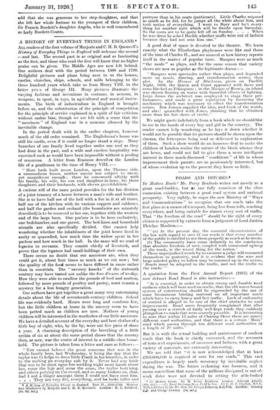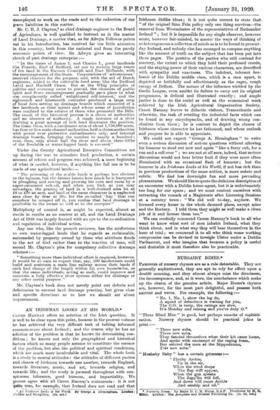ROADS AND DITCHES.*
IN Modern Roads' Mr. Percy Boulnois writes not merely as a great road-builder, but as one fully conscious of the close connexion existing between a good road system and national prosperity. Very rightly, he urges the new Ministry of "Ways and Communications" to recognize that our roads take the first place as a means of transport, being free from tolls, reaching everywhere, and being suitable for almost every sort of traffic. That "the freedom of the road" should be the right of every citizen is supported by extracts from a judgment of Lord Justice Fletcher Moulton :— " (a) At the present day the essential characteristics of the law with regard to user of our roads is that every member of the public is entitled to use them properly as much as he needs.
(b) The community have come definitely to the conclusion that absolute freedom of user, coupled with communal upkeep of the roads, is the wisest thing for the nation.'
These unprejudiced words by so eminent a judge will commend themselves to posterity, and it is evident that the wise and large-minded policy to follow may be summed up in the axiom, 'Roads must be adapted to the traffic, and not the traffic to the roads.'"
A quotation from the First Annual Report (1911) of the now defunct Road Board is also instructive :— " It is essential, in order to obtain strong and durable road surfaces which will bear modern traffic, that the old water-bound system of construction should be superseded by the use of some bituminous binding material on all important roads which have to carry heavy and fast traffic. Lack of uniformity of control is alleged to be one of the chief obstacles to road improvement. Road users frequently complained that after passing over a stretch of fairly well-kept roads they suddenly plunged on to roads that, were scarcely passable. It is interesting to note that within 15 miles of Charing Cross there are ninety different road authorities, and that there is a certain ' Main ' road which passes through ten different road authorities in a length of 20 miles."
But it is with the actual building and maintenance of modern roads that the book is chiefly concerned, and the accounts of tests and experiments, of successes and failures, with a great variety of materials, are extremely interesting.
We are told that "it is now acknowledged that at least £300,000,000 is required at once for our roads." This vast expenditure is largely made necessary by inevitable neglect during the war. The future reckoning was foreseen, and it seems marvellous that some of the millions dissipated in out-of- work doles were not devoted to setting the able-bodied • (1) Modern Loa& By H. Percy Boulnola. London : Edward Arnold. [las. net.] —(2) Land Drainage from Field to Sea. By C. If. 5. Clayton, 31.8.E. With a Preface by the Itt. lion. Sir AlhvynYCilOWC3. LUNA). London: COUidlj Life and George tieWlitt. 16a set.]
unemployed to work on the roads and to the reduction of our grave liabilities in this matter.
Mr. C. H. J. Clayton,' as chief drainage engineer to the Board of Agriculture, is well qualified to instruct us in the matter of Land Drainage, a matter that, as Sir Ailwyn Fellowes points out in his Introduction, has received far too little attention in this country, both from the national and from the purely economic points of view. Sir Ailwyn gives an interesting sketch of peat drainage enterprise :— " In the times of James I. and Charles I., great landlords like Francis, Earl of Bedford, set out to reclaim large tracts of fen land in the Eastern Countith and East Midlands, with the encouragement of the State. Corporations of ` adventurers' received charters for the purpose, and, with the aid of Dutch engineers, added to the cultivable land areas like the Bedford Level and Hatfield Chase. But as the Whig principles of politics and economy came to prevail, the elements of public spirit and State encouragement gradually gave place to what was complacently called' enlightened self-interest,' and the eighteenth and nineteenth centuries produced a large crop of local Acts setting up drainage boards which consisted of a few landlords or their agents and whoa() areas of jurisdiction were confined to the estates of those who promoted the Bills. The result of this historical process is a cheos of authorities and an absence of authority. A single instance of a river draining a great &image of rich land illustrates the position. The Great Ouse, with a catchmerrt area of abmt 1,750,000 acres, has four or five main channel authorities, half-a-clozen authorities with power over protective embankments only, and internal drainage boards, bringing the number to nearly a hundred ; even then, only about half the river and about three-fifths of the floodable or water-logged lands is covered."
Under the County Agricultural Executive Committees set up during- the war to stimulate food production, a certain amount of reform and progress was achieved, a mere beginning of what is needed, however, if anything like full use is to be made of our agricultural lands :—
"The poisoninc, of the arable lands is perhaps less obvious to the layman, but the farmer knows how much he is hampered in ploughing. and sowing and growing his corn and roots- by a super-saturated subioil, and when you find, as you may nowadays, the grazing of land in a well-drained area let at £8 to £10 an acre, and land of the same character in a neglected area close by dear at 30s. for the so-called 'hay' that can somehow be scraped off it, you realize that land drainage is profitable to the owner as well as to the occupier."
Multiplicity of control is, as might be expected, almost as sterile in results as no control at all, and the Land Drainage Act of 1918 was largely framed with an eye-to the co-ordination and regulation of individual action.
Any one who, like the present reviewer, has the misfortune to own water-logged lands that he regards as reclaimable, surrounded by property owned by those who attribute floods to the act of God rather than to the inaction of man, will second Mr. Clayton's plea for compulsory collective drainage schemes :—
"Something more than individual effort is required, however. It would be as vain to expect that, say, 500 landowners could build and maintain a main line railway across their lands if each had charge of the length within his own boundaries, as that the same individuals, acting as such, could improve and maintain a fully effective river system either for drainage or any other useful purpose."
Mr. Clayton's book does not merely point out defects and deficiencies in current land drainage practice, but gives clear and specific directions as to how we should set about improvement.



































 Previous page
Previous page